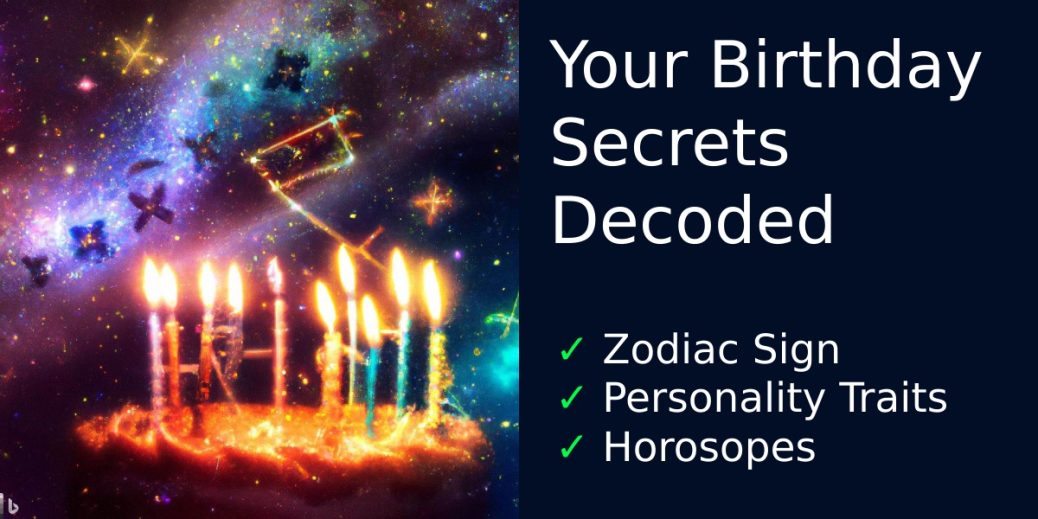Birthday Analysis - Enter Your Birth Date
Born in August 1945 - Zodiac Signs, Personality and Horoscopes

Please select your birth date for birthday analysis.
| S | M | T | W | T | F | S |
|---|---|---|---|---|---|---|
| 1 | 2 | 3 | 4 | |||
| 5 | 6 | 7 | 8 | 9 | 10 | 11 |
| 12 | 13 | 14 | 15 | 16 | 17 | 18 |
| 19 | 20 | 21 | 22 | 23 | 24 | 25 |
| 26 | 27 | 28 | 29 | 30 | 31 | |
August 1945 Tropical Ephemeris
Note: A person's zodiac sign typically refers to their Sun sign, Moon position is location and time sensitive.| Planet | Date Range | Zodiac Sign |
|---|---|---|
| Sun | August 1, 1945 to August 23, 1945 | Leo |
| Sun | August 24, 1945 to August 31, 1945 | Virgo |
| Moon | August 1, 1945 to August 2, 1945 | Taurus |
| Moon | August 3, 1945 to August 4, 1945 | Gemini |
| Moon | August 5, 1945 to August 6, 1945 | Cancer |
| Moon | August 7, 1945 to August 9, 1945 | Leo |
| Moon | August 10, 1945 to August 11, 1945 | Virgo |
| Moon | August 12, 1945 to August 14, 1945 | Libra |
| Moon | August 15, 1945 to August 16, 1945 | Scorpio |
| Moon | August 17, 1945 to August 19, 1945 | Sagittarius |
| Moon | August 20, 1945 to August 21, 1945 | Capricorn |
| Moon | August 22, 1945 to August 23, 1945 | Aquarius |
| Moon | August 24, 1945 to August 25, 1945 | Pisces |
| Moon | August 26, 1945 to August 27, 1945 | Aries |
| Moon | August 28, 1945 to August 29, 1945 | Taurus |
| Moon | August 30, 1945 to August 31, 1945 | Gemini |
| Mercury | August 1, 1945 to August 17, 1945 | Virgo |
| Mercury | August 18, 1945 to August 31, 1945 | Leo |
| Venus | August 1, 1945 to August 4, 1945 | Gemini |
| Venus | August 5, 1945 to August 30, 1945 | Cancer |
| Venus | August 31, 1945 to August 31, 1945 | Leo |
| Mars | August 1, 1945 to August 31, 1945 | Gemini |
| Jupiter | August 1, 1945 to August 25, 1945 | Virgo |
| Jupiter | August 26, 1945 to August 31, 1945 | Libra |
| Saturn | August 1, 1945 to August 31, 1945 | Cancer |
| Uranus | August 1, 1945 to August 31, 1945 | Gemini |
| Neptune | August 1, 1945 to August 31, 1945 | Libra |
| Pluto | August 1, 1945 to August 31, 1945 | Leo |
| North Node (Rahu) | August 1, 1945 to August 31, 1945 | Cancer |
| South Node (Ketu) | August 1, 1945 to August 31, 1945 | Capricorn |
Chinese Zodiac Sign
Rooster (鸡)
Age
80 years and 5 months old
If you were born on 1st August, 1945, you are 80 years old as on January 1, 2026.
Your next birthday is 6 months away.
What happened in August 1945
- August 6, 1945: Hiroshima was devastated by the atomic bomb dropped by the U.S., resulting in mass casualties and long-term health effects.
- August 7, 1945: President Truman announced the atomic bombing of Hiroshima, marking a significant escalation in World War II.
- August 8, 1945: The U.S. joined the United Nations, demonstrating its commitment to international cooperation and peace.
- August 9, 1945: Nagasaki was struck by a second atomic bomb, further emphasizing the destructive power of nuclear weapons.
- August 10, 1945: Japan's surrender offer marked a turning point in World War II, signaling the end of the conflict.
- August 11, 1945: The Allies' response to Japan's surrender offer set the stage for the postwar occupation of Japan.
- August 13, 1945: Discussions regarding the establishment of the state of Israel began between the Zionist World Congress and the British government.
- August 14, 1945: Emperor Hirohito's acceptance of the Potsdam Declaration paved the way for Japan's surrender and the end of World War II.
- August 15, 1945: Emperor Hirohito's surrender broadcast marked a historic moment in Japanese history, signaling the end of the war.
- August 17, 1945: President Laurel's proclamation marked the end of the Second Philippine Republic and his presidency.
- August 18, 1945: Subhas Chandra Bose's death marked a significant loss for the Indian independence movement.
- August 19, 1945: The meeting between Mao Zedong and Chiang Kai-shek represented an attempt to resolve the ongoing conflict between the Communists and Nationalists in China.
- August 23, 1945: Stalin's order to detain Japanese prisoners of war in the Soviet Union had long-lasting consequences for those affected.
- August 25, 1945: Bảo Đại's abdication marked the end of the Nguyễn dynasty and the beginning of a new era in Vietnamese history.
- August 30, 1945: The Viet Minh's capture of Hanoi led to the division of Vietnam into North and South Vietnam, shaping the course of the country's history.
- August 31, 1945: The arrest of German field marshal Walther von Brauchitsch marked a significant moment in the aftermath of World War II.